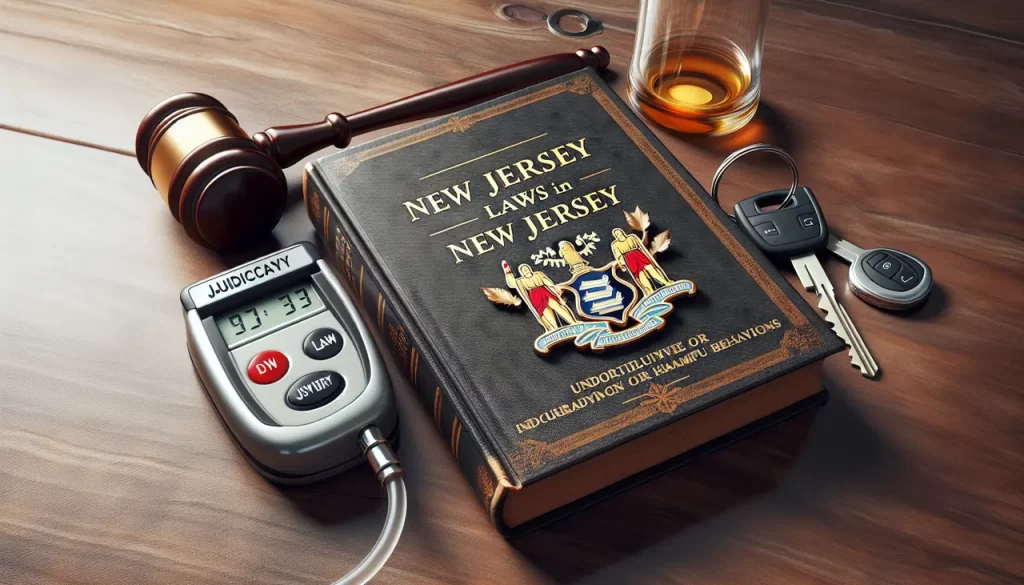Introduction to DUI Laws in New Jersey
In New Jersey, driving under the influence (DUI) is a serious offense, and the laws are strict. Whether it’s your first time or you’ve been down this road before, understanding these laws is crucial. Essentially, if you’re caught driving with a blood alcohol concentration (BAC) of 0.08% or higher, you’re in violation of the law. But it’s not just alcohol that can land you in hot water; any impairment by drugs, including prescription medications, counts too. The state doesn’t take kindly to impaired driving, putting everyone’s safety at risk. Penalties vary based on several factors like your BAC level and the number of offenses you’ve racked up. For first-timers, consequences can range from losing your license to fines and even jail time. Remember, New Jersey operates under an implied consent law. This means when you get behind the wheel, you’ve automatically agreed to take a breath test if stopped. Refusing this test can lead to more severe penalties. So, if you plan to drink, think twice before driving. The risks just aren’t worth it. Stay safe, stay informed, and consider alternatives like public transport or a designated driver to keep the roads safe for everyone.
Key Definitions Under New Jersey DUI Laws
In New Jersey, DUI means driving under the influence, either of alcohol or drugs. Here’s the simple breakdown of what you need to know. DUI is often used interchangeably with DWI, which stands for driving while intoxicated. The difference? There’s none in New Jersey; both terms mean the same. A big term you’ll hear is BAC – Blood Alcohol Concentration. This tells how much alcohol is in your system. In New Jersey, if you’re 21 or over, a BAC of 0.08% or higher is over the limit. For those under 21, any BAC higher than 0.01% can get you in trouble. Another key term is Implied Consent. This means when you drive in New Jersey, you agree to take a breath test if asked. Saying no can lead to more penalties. Remember, New Jersey takes DUI seriously, aiming to keep the roads safe for everyone.
Penalties for First-Time DUI Offenders in New Jersey
In New Jersey, getting caught driving under the influence (DUI) is no small matter, especially for first-timers. The penalties are stiff, designed to deter anyone from making it a repeat offense. If you’re a first-time offender with a blood alcohol concentration (BAC) of 0.08% but less than 0.10%, you’re looking at a fine that ranges from (250 to )400. But that’s not all. You’ll also face a detainment in an Intoxicated Driver Resource Center (IDRC) for a couple of days, which is mandatory and comes out of your pocket, plus you’re on the hook for various other fees and surcharges that can add up to more than $1,000. Your driver’s license isn’t spared either; expect it to be suspended for about three months.
Now, if your BAC was higher, say 0.10% or more, the game changes. The fines increase to (300 to )500, and your license gets suspended for up to a year. In some cases, you might even need to install an ignition interlock device in your vehicle, which ensures you can’t start the car if you’ve been drinking. This device sticks with you for about six months to a year after getting your license back.
Here’s the kicker – these penalties apply no matter how good your driving record was before. Plus, if your DUI involved other factors, like having a minor in the vehicle, you could be looking at even harsher penalties. So, think twice before getting behind the wheel if you’ve been drinking. It’s not worth the risk, not to mention the hefty price you’ll pay.
The Importance of Legal Advice for DUI Charges
When you’re hit with a DUI charge in New Jersey, seeking legal advice isn’t just helpful; it’s crucial. Each case has its own twists and turns, and without a skilled lawyer, you might miss out on strategies that could significantly impact your case’s outcome. A DUI charge isn’t just a minor hiccup. New Jersey takes these offenses seriously, and the penalties can be severe, ranging from hefty fines, loss of driving privileges, to even jail time for some. An experienced DUI attorney knows the ins and outs of the law and can offer advice tailored to your specific situation. They can negotiate on your behalf, potentially reducing penalties or even getting the charges dismissed under certain circumstances. Remember, the goal is to minimize the charge’s impact on your life, and navigating this complex legal landscape without a professional could leave you at a significant disadvantage.
Understanding Blood Alcohol Concentration (BAC) Limits
In New Jersey, like elsewhere, Blood Alcohol Concentration, or BAC, is a big deal when it comes to driving. It measures how much alcohol you’ve got in your system. The magic number here is 0.08%. If you’re 21 or over and driving with a BAC at or above this, you’re officially over the limit, meaning you’re breaking the law. For folks under 21, the rules are tighter; any BAC above 0.01% could get you in trouble because of New Jersey’s zero-tolerance policy. Commercial drivers have their own set of strict rules, facing penalties if their BAC hits 0.04% or more.
Remember, your BAC level can affect your driving ability, with risks increasing significantly as your BAC rises. New Jersey’s approach aims to keep roads safe by drawing clear lines. If you’re caught over these limits, you’re looking at DUI charges, which carry heavy penalties. It’s simple: stick below these BAC limits, and you keep things straightforward on the road.
How DUI Charges Affect Your Driving Privileges
In New Jersey, getting hit with a DUI charge is a big deal. It’s not just about the fine or potential time behind bars; it’s also about how it messes with your driving privileges. Right off the bat, if you’re found guilty of a DUI, expect your license to get yanked. This isn’t a maybe; it’s a sure thing. The length of time you’ll be without a license depends on how high your blood alcohol concentration (BAC) was at the time of arrest and if you’ve been down this road before. For first-timers, if you blew between a 0.08% and 0.10%, your license could be gone for about three months. But get this, if you were really overdoing it and your BAC was over 0.15%, you might not be driving for closer to six months to a year. Plus, the state could make you put a breathalyzer in your car—the kind that won’t let the engine start until you blow a sober reading. And let’s not forget, once you do get your license back, you’re looking at paying through the nose for car insurance because now you’re tagged as high-risk. In a nutshell, a DUI in New Jersey means you’re likely to be catching the bus for a while, and it’ll cost you big time both to get your license back and to keep your car on the road afterward.
The DUI Court Process for First-Timers
When you’re tagged with a DUI in New Jersey, fasten your seatbelt; you’re in for a ride through the court process. As a first-timer, it’s crucial to grasp what’s coming. Initially, you’re pulled over, and if the officer thinks you’re over the limit, you’re tested and likely arrested. Next up is your arraignment. This is where you hear the charges and say if you’re guilty or not. Saying “not guilty” means you’ll fight the charges, possibly pleading to a lesser offense later. If you go the “guilty” route, you’re fast-tracked to sentencing.
Your case might bounce between municipal court for minor issues and Superior Court for serious charges. Each has its walkthrough, but for first-timers, municipal court is likely your arena. Here, penalties range, focusing on fines, license suspension, and sometimes community service or an ignition interlock device. Don’t forget the Intoxicated Driver Resource Center – New Jersey insists on this education and evaluation step.
It’s a step-by-step dance. Miss a step, and you trip. Legal representation isn’t just advised; it’s your best gear for this journey. They know the steps by heart and can sometimes get you through with less stumbling – think lesser charges or even dismissals in rare cases. Every DUI case writes its own story, but knowing the plot helps you navigate the chapters.
Seeking Legal Representation: Tips and Options
If you’re facing a DUI charge in New Jersey, getting a good lawyer should be your top priority. Navigating DUI laws can be tricky, and the right legal help can make a substantial difference in your case. First off, understand not all lawyers are the same. Look for someone with experience in DUI cases. They’ll be familiar with the courts, the judges, and all the complexities of DUI law.
Here’s what you should do:
- Ask around: Word of mouth can be a reliable way to find a competent attorney. Friends or family who have faced similar situations might lead you to the right person.
- Do your homework: Research online, look at reviews, and make a list of potential lawyers. Then, take the time to meet with them and ask questions about their experience and success rates.
- Consider the costs: Legal fees aren’t cheap, but the cheapest option may not be the best. Some attorneys might offer payment plans or sliding scale rates based on your financial situation.
- Feel comfortable: Your lawyer should be someone you’re comfortable talking to and who understands your situation.
You’re not just hiring someone to defend you; you’re trusting them with a significant part of your life. Make the decision wisely. Remember, having an experienced DUI attorney can significantly affect the outcome of your case, possibly reducing your charges or even getting them dropped altogether.
Possible Defenses in a DUI Case
Even if you’re facing a DUI charge in New Jersey, it’s not the end of the road. There are several defenses your lawyer might use to minimize the impact or even get your case dismissed. First, there’s the accuracy of the Breathalyzer. These machines need regular calibration and proper handling. If there’s evidence that the Breathalyzer was faulty or misused, your case stands a chance. Another angle is the legality of the traffic stop. Cops can’t just stop you for no reason; they need a valid suspicion, like swerving or running a stop sign. If they stopped you without a good reason, your charges could be dropped. Then, there’s the field sobriety test’s reliability. These tests can be subjective and influenced by factors like the road’s condition or your physical state. If these tests were poorly conducted or interpreted, that’s another potential defense. Knowing these defenses can shine a light on possible ways out of a tight spot. Remember, a skilled DUI attorney is your best ally to navigate through these defenses effectively.
Preventive Measures to Avoid Future DUI Offenses
Avoiding future DUI offenses is crucial, not just for your legal record but for your safety and that of others. Start by always planning a safe ride home if you plan to drink. This could mean arranging a designated driver, using a ride-sharing app, or utilizing public transportation. Also, get familiar with your alcohol tolerance. It’s different for everyone, and understanding how much is too much can prevent future mistakes. Consider attending alcohol education programs or therapy if you find it challenging to control your drinking habits. These programs can offer valuable insights into responsible drinking and help you understand and avoid the behaviors that lead to DUI offenses. Lastly, keep yourself informed about the consequences of DUI, including the legal, financial, and personal impacts. Keeping these consequences in mind can serve as a strong deterrent against future offenses. Remember, the goal is to make responsible choices that ensure your safety and the safety of others on the road.


